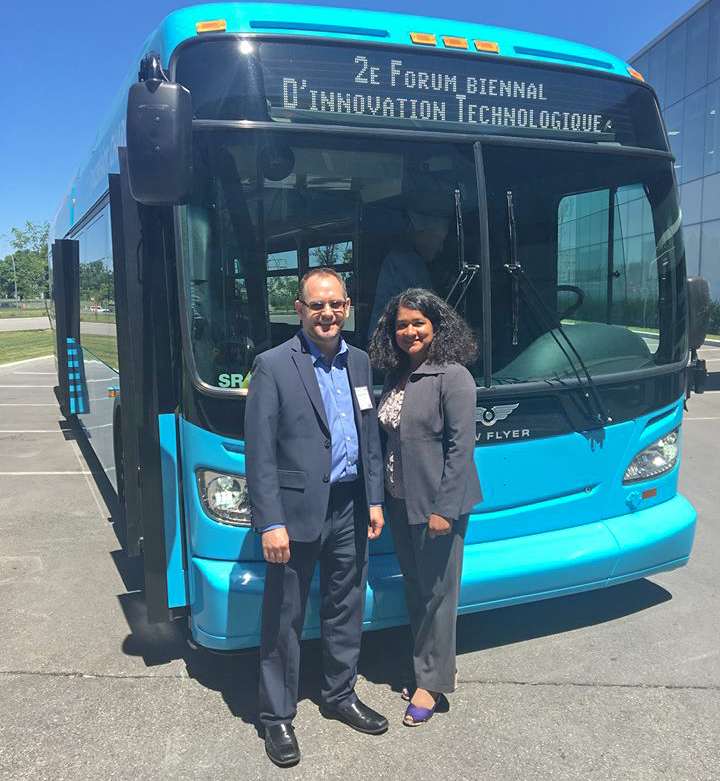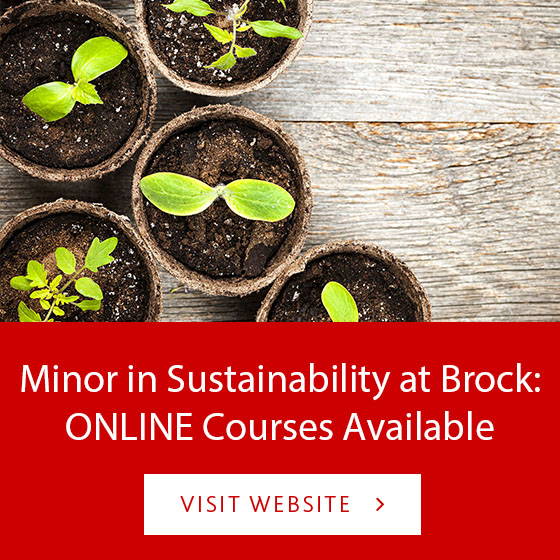It’s a simple, logical way to cut down on air and noise pollution.
Electric buses don’t emit carbon or use fossil fuels, are low cost to maintain and, by the silent way they operate, reduce noise pollution compared to conventional buses.
But replacing current buses with electricity-powered ones is easier said than done, says master’s student Tasnuva Afreen.
Afreen recently wrapped up an eight-month internship with the Canadian Urban Transit Research and Innovation Consortium (CUTRIC) to collect and interpret information related to transit authorities’ transition to electric buses.
“Now we’re trying to connect the dots,” says Afreen, who is in Brock’s Sustainability Science and Society program. “We hope to bring out what Canadians think of electric buses and identify the main barriers to bringing electric buses to transit authorities’ fleets.”
Afreen, Associate Professor of Geography and Tourism Studies Christopher Fullerton and CUTRIC created the internship through the not-for-profit national research organization Mitacs.
Mitacs partners with academics, private industry and governments to conduct research and training programs related to industrial and social innovation. The organization funds a number of research projects at Brock University.
During her internship, Afreen organized consultations with industry representatives, transit authorities, government officials and academic researchers.
She and her CUTRIC colleagues asked participants a series of questions about transit authorities’ experiences and challenges of experimenting with electric buses and the knowledge they need to acquire and integrate hydrogen fuel cell vehicles into their fleets.
Afreen also asked transit riders to share their opinions on and experiences with electric buses.
She then transcribed the consultation sessions and analyzed the comments. Afreen also gathered information on how to test electric buses in nine municipalities that expressed interest in becoming demonstration trial sites.
Although she and Fullerton are still analyzing the data, Afreen says her preliminary results show that there’s much interest in putting electric buses on the road.
But there are a number of barriers to overcome, she says.
“Municipalities have to redesign their infrastructure to provide electric lines so that buses can recharge very quickly,” says Afreen. “Also, the upfront expense is huge — a lot of transit agencies don’t have the money in their pocket to go for this.”
Fullerton, Afreen’s supervisor, says the research she conducted will lay the groundwork for CUTRIC’s efforts to encourage the adoption of electric buses across Canada.
“While it has already demonstrated clear environmental, social and economic benefits in other parts of the world, electric bus technology is still relatively new and adopting it represents a major funding commitment,” says Fullerton.
“Public transit agencies and other stakeholders, such as the various levels of government that provide subsidies for transit infrastructure, want to make sure that the technology is reliable and that their money is well spent,” he says, adding that Afreen’s work helps identify stakeholders’ concerns and information needs.
Afreen will share her Mitacs-supported internship experience at Brock’s Shift Conference Tuesday, April 30 and the Launch Forum Wednesday, May 1. Mitacs Director Rebecca Bourque and Office of Research Services staff will be join Afreen at Launch in the 10 to 11:30 a.m. session in the Cairns Atrium to explore how faculty member and graduate student teams can navigate Mitacs internship opportunities.
“Mitacs internships offer graduate students a valuable experience working with industry or community organizations,” says Industry Liaison and Partnership Officer Iva Bruhova. “It is a chance to apply their research skills and gain employment-ready skills.”
In addition to the Mitacs session, the Launch event offers two other sessions on how faculty and staff can support graduate students through designing individual development plans.
For more information, contact ibruhova@brocku.ca or kperry@brocku.ca







